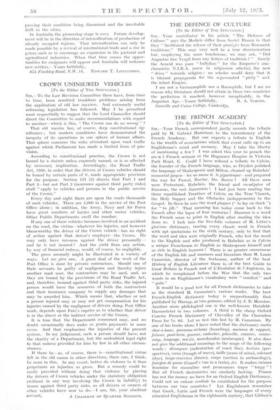THE FRENCH ACADEMY [To the Editor of THE SPECTATOR.] SIR,—Your
French correspondent justly records the tribute paid by M. Gabriel Hanotaux to the tercentenary of the French Academy. But one expects a tribute in English to the wealth of associations which that event calls up to an Englishman's mind and memory. May I take the liberty of mentioning a few ? I was asked this year to preach the. am u a French sermon at the Huguenot Hospice in Victoria Park Road, E. Could I have refused a tribute to Calvin, the founder of the French language, who, as Dryden polished the language of Shakespeare and Milton, cleaned up Rabelais' immortal jargon—let us name it le gigantesque—and prepared the way for Pascal, Racine, Ste. Beuve ? All these men were Protestant, Rabelais, the friend and 'co=adjutor of Erasmus, the rest Jansenists I I had just been reading the three republished Treatises of Calvin on the True 'Church, the Holy Supper and the Obstacles (achoppements) to the Gospel. In these he uses the word plaquer (" to lay on thick ") for " to jilt." That meaning has today come back to the French after the lapse of four centuries ! Humour is a word the French seem to print in English after stealing the idea from us. I look into the five-folio volumes of M. Littre's glorious dictionary, tracing every classic word in French With apt quotations to the sixth century, only to find that the word and idea were originally French, who lost the word to the English and who produced in Rabelais as in Calvin a unique Frenchman as English as Shakespeare himself and as rich in English humour ! There is no greater connoisseur of the English life and manners and literature than M. Louis Cazamian, director of the Sorbonne, author of the best History of English Literature there is, of the best Guide to Great Britain in French and of L'Evolution de l'Angleterre, in which he complained before the War that the only two words in an Englishman's vocabulary were " comfort " and gain.,, It would be a good test for all French dictionaries to take as the standard M. Cazamian's various works. The best French-English dictionary today is unquestionably that published by Harrap, at two guineas, edited by J. E. Mansion. Another more philological one is the well-known Hatzfeld- Darmesteter in two volumes. A third is the cheap Oxford Concise French Dictionary of Chevalley of the Clarendon Press for 7s. 6d. Let us test this last by M. Cazamian. By one of his books alone I have noted that the dictionary omits char-ha-bane, panneau-reclame (hoarding), maisons de rapport, friseur, pont-levis, guenon, embodier, gdtouille, crassier, contre- coup, truquage, moucharabis (arabesque). It also does not give the additional meanings to the usage of the following words : decoupure (indentation of coast line), horizon (per- spective), creux (trough of wave), taille (seam of mine), colorant (dye), longs-courriers (liners), coupe (section in archaeology), fourgon de queue (Guard's van in a train), cee. It makes cuisson feminine for masculine and pronounces trapu " trapy " I But all French dictionaries are similarly lacking. France has not the money we have for an Oxford English Dictionary. Could not an entente cordiale be established for the purpose between our two countries ? Let Englishmen remember that Greek, Latin and French were the languages of every educated Englishman in the eighteenth century, that Gibbon's, Mdmoi re Justificatif written for King George III was so perfect that it was taken in France for the work of a Frenchman and that Macaulay had a greater knowledge of French litera- ture in general than M. Guizot himself. Also let us remember that Ste. Beuve's grandmother was English (Middleton). Nothing in English can equal the monument to the French language erected by M. Littre's dictionary. But it needs supplementing and recasting to. compass the whole round of French as she is spoken and written today.—Yours very











































 Previous page
Previous page